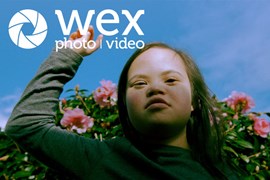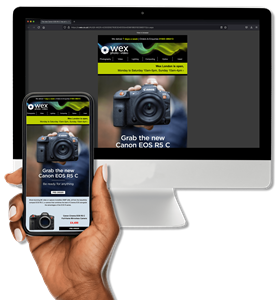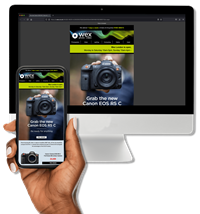
Anna Neubauer is an up-and-coming photographer who has made waves within the industry for her compelling portraiture. Championing the representation of people with disabilities and visible differences, Anna captures story-led portraits of individuals who are often misunderstood or overlooked.
Over the past 5 years, Anna has accrued multiple awards for her images including two 2023 Portrait of Britain awards and being named Adobe Rising Star of Photography 2021.
In this interview, we speak to Anna about the impact of her work on the individuals in her images as well as how it has shaped the way that she approaches image-taking.
Leo White: To begin with, can you tell me about yourself and your creative background?
Anna Neubauer: Well, I'm self-taught. I don’t have any degree in photography or anything. I studied time-based media which is anything but photography and that encouraged me to spend my time learning how to use my camera.
I started posting my images on Flickr and through that, I met so many interesting people. I travelled to America and Germany for photography meetups where we’d learn from each other and do photoshoots. It was really amazing and some of those people are really well-known photographers now.
I remember one time, I was staying with my brother in New York and I wanted to go to Washington DC for a meetup. My brother said that it wasn’t a good idea - I kind of agreed as I’d never met them. Shortly after, I went for a walk in Central Park and I met some people, all of whom had cameras. We started talking and sure enough, it turned out that they were going to that very meetup in DC. So, I went with them and the rest is history!
That’s amazing! It shows that you don’t need to study to be a fantastic photographer. The connections you made with other photographers and the tips and tricks they shared helped you get to where you are today.
LW: While researching, I noticed that you've mentioned that you’re not really into the latest camera kit. So, what kind of kit do you use?
AN: It's a very old Canon 5D MK II and despite what people may think, I think you can take pictures with whatever you have. I mean, this camera is all I’ve ever had.
In moments of self-doubt, I have questioned my work and the camera I use - people from my hometown would ask what camera I use and when I’d say a Canon 5D MK II and a 100 Euro lens, they’d say “oh, that’s rubbish.”
More often than not, excellent photography comes down to a person’s artistic eye - not the kit they use.
LW: With the work that you create, the lighting seems very soft. Do you lean toward natural lighting over lighting setups?
AN: I don't really use artificial lighting. I'm part of a photography group in the UK; most are beauty and fashion photographers and often talk about lighting. Their work is phenomenal and I feel very grateful to be a part of the group - the support and sense of community is amazing. But despite this, I know that this isn’t the type of work I want to do. I have been offered jobs that specify artificial lighting but I don’t always take them because that’s generally not how I shoot. I’m always up for a challenge but it’s important for me to focus on the storytelling without distraction.
I just like natural light because of the softness and I work with people that don't really appreciate the large lighting setup. Also, I work with kids and it’s hard enough to get them to stay put. I like shooting with natural light and I'm going to stay like that.

LW: You recently won the 2023 Portrait of Britain award, alongside some other accolades. Did you expect to receive this kind of response to your imagery?
AN: I tend to not really define myself with awards and such, but it is nice to have your work recognised in that way. I think I am a very easy going person. I never force anything. The work is about the subjects rather than winning awards. I mean, to be honest, I just love photography.
LW: Do you have any other projects at the moment or are you continuing on from what you're doing?
AN: After a busy and somewhat hectic 2022, I told myself to take it easy. Travel, illness and logistical issues left me needing to slow down and reflect.
I occasionally work with Adobe and I have some regular commercial work with kids, updating portfolios etc. But other than those jobs, I have a documentary project I am working on at the moment but there is no rush. These projects don’t always play out as you plan them and I don’t want to force the idea. I have found that if you have an idea and it doesn't work out - it can throw you off the tracks.
I tend not to do big commercial jobs if they don’t fit with my style or workflow. It’s funny - when I got into photography, I thought you had to shoot massive campaigns like America's Next Top Model or whatever, but that's actually my worst nightmare now. And, I find that more often than not that these jobs don’t align with my values.

LW: Why is it important for you to photograph the individuals in your images? What led you to champion the representation of people with disabilities and visible differences?
AN: Back home, I took a job at an advertising agency. I hated it. I quickly learned to dislike the advertising industry because of how the models were treated and judged. Although, this wasn’t my first experience with it. When I was younger I acted on stage and TV, and I experienced the same type of judgement.
Sometime later, I was contacted for a photography campaign. I thought, “wow, they want me!” I was quite honoured about it. I thought maybe I could actually be a freelance photographer.
Early on, I noticed that they seemed pretentious and very judgmental. But again, from my experience, I thought this is just how the industry works - judge people and be “honest”.
They booked a model and she didn't look like the photos in her portfolio. I guess most don’t because of lighting or editing etc. A while into the shoot, they instructed us to take a break and I knew that something was wrong, despite them telling me the shots were perfect and to just keep doing what I was doing.
The model left the room and I heard them say “wow, she’s really ugly.” This really hit me. I thought, who are you to judge? You booked her?! After that, they told me to start cropping her face to only show her hands or her neck. This was all the more painful because the model kept looking at the monitor and could see that the shots weren’t focused on her face. This was really hard because I would never do that to someone. But I had to do what the client wanted. After the shoot, I didn't know what to think. I was so confused. What did I just take part in?
There were several more shoots but in the end, it didn’t work out. I check their social media every so often as I’m curious to see what their models look like and if they’ve changed. They have not. I realised I needed to change something but I was unsure how to approach it.
In 2019, I moved to London and everything changed.
LW: London is a cultural melting pot with people from all over the world - different faiths, ethnicities and languages. Was there a defining moment that influenced your photography?
AN: I think it was the people I met. I moved into a shared-living apartment building. I didn't know anyone but the people were amazing and I felt at home straight away.
I’ve been fortunate enough to have travelled a fair amount but the difference between home and London is stark. It was noticing this that I realised there was something I can change. I didn't know how to do it - but I didn't put any pressure on myself. I started working for Nickelodeon and pursued my photography on the side. Then, it all just kind of fell into place.
LW: In your recent work, you have photographed individuals with disabilities and visual differences, championing their representation and providing a platform to be seen. Have you come across negative feedback regarding this?
AN: Not so much in London. But when I go back to Austria, unfortunately, there is some negativity. I always try to treat everyone the same whether they have Down Syndrome or any other disability. There’s always a way you can communicate with someone, even if they can’t verbally express themselves.
Back home, there isn’t as much acceptance. Even just being a professional photographer full-time is difficult for them to accept. I tried explaining the concept of my Kings Cross exhibition and some other projects - I took my time to speak very slowly and explain, but this was met with confusion.
LW: Your move to London and being exposed to more open-mindedness and acceptance of different types of people have obviously influenced your work. Would you say that is your goal to help a societal shift towards open-mindedness?
AN: Yes. Although, it doesn’t matter if I don’t change the minds of the whole nation. For me, even if I can educate just a single person, it’s a success. There’s always something you can do.
I agree. Social change on a mass scale can be difficult and (frustratingly) requires incremental steps to insight that change.

LW: During interviews, are there any questions you would like to have asked that haven’t? For example, we're talking about the purpose of your work. Are there any aspects of your work that people might not be seeing or latching on to straightaway?
AN: Well, people often ask me how my work affects the public. But there aren’t many who ask me what it does for me. Like, if it has changed anything in me.
LW: Well, let’s cover that! Has your photography changed anything in you? How has your journey as a photographer grown and adapted? How do you feel now compared to how you did?
AN: A lot has changed. As a kid, I grew up in a small town and was an extrovert. I was certainly a bubbly child. But as I’ve grown up, I’ve become more reserved and self-conscious. But that mainly stems from when I go to my hometown. People talk a lot. In my hometown, photography isn’t considered a profession.
But since I moved to London, what’s changed is that I don't care as much anymore. I am more open-minded and when I take pictures of people - not just people with disabilities - I love listening to their stories and making a connection. There's always something where I think “Oh, this is amazing! I never thought about this before” like learning that you can communicate with those who can’t verbally express themselves.
In 2021, I had a shoot for Adobe where I worked with a little girl called Megan who was nonverbal. I asked about her favourite colour and they said they don't really know, but the Sister thinks yellow. I was nervous about it because it can be so awkward. I don't want to be invading her personal space and taking pictures - it felt almost like harming her. But somehow we realised our mutual love of the films Moana and Frozen. Having made that connection, I never would have thought that you can connect with someone so intimately.
Had a shoot with a person called Kofi who has Downs syndrome. I wouldn't have known it but by taking the time to talk and connecting with him, I learned he is an amazing karaoke singer! I love a bit of karaoke too, so this gave me that point of connection that brought us both onto the same level where we could work together for the shoot.
So, learning to have a connection with the individual I am photographing is definitely something that has changed me and my photography.
About the Author
Leo White has been a member of the Wex Photo Video team since 2018, working in a variety of roles ranging from the contact centre to the product setup team. With both a photography BA and MA, Leo has a wealth of knowledge he's ready to share.













